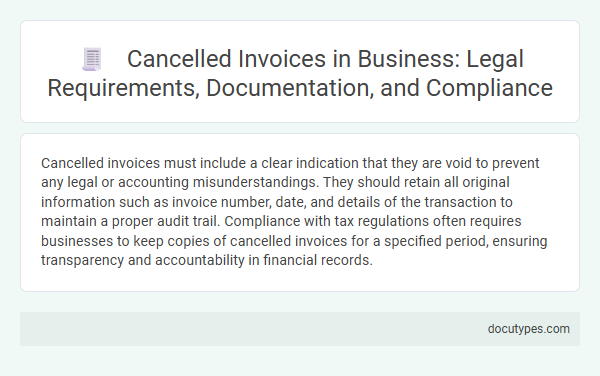Cancelled invoices must include a clear indication that they are void to prevent any legal or accounting misunderstandings. They should retain all original information such as invoice number, date, and details of the transaction to maintain a proper audit trail. Compliance with tax regulations often requires businesses to keep copies of cancelled invoices for a specified period, ensuring transparency and accountability in financial records.
Understanding Cancelled Invoices: Definition and Importance
Cancelled invoices are official documents indicating that a previously issued invoice is no longer valid. Understanding cancelled invoices is essential to ensure accurate financial records and compliance with tax regulations. You must retain these documents properly to avoid discrepancies during audits and maintain transparent business transactions.
Legal Requirements for Cancelling Invoices
What Are the Legal Requirements for Cancelling Invoices? Cancelled invoices must clearly state the reason for cancellation to maintain accurate financial records. You are required to keep these documents for a specific period, usually ranging from five to seven years, depending on local tax laws.
Documentation Needed for Invoice Cancellation
Cancelled invoices must comply with legal documentation requirements to ensure validity and avoid disputes. Proper records must include the original invoice and a clear indication of cancellation.
Supporting documents such as a cancellation note or a credit memo are essential for audit trails. Maintaining detailed records helps meet tax authority regulations and prevents penalties.
Proper Procedures for Cancelling Invoices
Legal requirements for cancelled invoices mandate clear documentation of the cancellation reason to maintain audit trails. Proper procedures include issuing a credit note or a cancellation statement linked to the original invoice number. Compliance with tax authority regulations ensures the cancelled invoice is accurately recorded in accounting systems to avoid financial discrepancies.
Record Keeping and Audit Trails for Cancelled Invoices
Cancelled invoices must comply with specific legal requirements to ensure proper record keeping and maintain audit trails. These requirements help businesses demonstrate transparency and accountability during financial audits.
- Retention Period - Cancelled invoices must be retained for a legally mandated period, typically ranging from 5 to 10 years depending on jurisdiction.
- Audit Trail Documentation - Each cancelled invoice must include clear documentation indicating the reason for cancellation and the person responsible for the action to maintain an accurate audit trail.
- Access and Security - Cancelled invoices should be securely stored but remain easily accessible for review during audits or regulatory inspections to verify compliance.
Compliance with Tax Regulations on Cancelled Invoices
Cancelled invoices must comply with specific tax regulations to ensure proper documentation and avoid penalties. Tax authorities require businesses to clearly mark invoices as cancelled to maintain transparency in financial records.
Maintaining accurate records of cancelled invoices is essential for audit purposes and tax reporting. Failure to comply with these regulations can result in fines and complications during tax assessments.
Common Reasons for Cancelling Invoices in Business
Cancelled invoices must meet specific legal requirements to ensure proper financial record-keeping and compliance with tax regulations. Accurate documentation helps prevent disputes and maintains transparency in business transactions.
Common reasons for cancelling invoices include errors in billing amounts, duplicate invoices, and changes in the order or service delivery. Incorrect customer details or returned goods also necessitate invoice cancellation. Following legal guidelines for cancellation protects your business from financial discrepancies and audits.
Impact of Cancelled Invoices on Financial Reporting
Cancelled invoices must comply with specific legal requirements to ensure accurate financial reporting and audit trails. Understanding these requirements helps you maintain transparent and compliant accounting records.
- Retention Requirements - Legal standards mandate that cancelled invoices be retained for a prescribed period for verification and tax purposes.
- Impact on Revenue Recognition - Cancelled invoices affect the reporting of revenue, necessitating adjustments in financial statements to reflect accurate income.
- Audit Trail Integrity - Proper documentation of cancelled invoices preserves the audit trail, supporting compliance and reducing risks of financial misstatement.
Best Practices for Managing Cancelled Invoice Documentation
| Aspect | Details |
|---|---|
| Legal Requirements for Cancelled Invoices | Cancelled invoices must comply with local tax laws and accounting standards. Usually, they require clear marking as "Cancelled" to avoid confusion during audits. Retaining a copy of the cancelled invoice is mandatory for a minimum retention period, often between 5 to 7 years depending on jurisdiction. |
| Invoice Identification | Cancelled invoices should maintain original invoice numbers and dates to ensure traceability and to prevent duplication or fraud. |
| Documentation Best Practices | Store cancelled invoices separately or flagged within the accounting system to differentiate from active transactions. Maintain electronic and/or physical copies with clear annotations explaining the cancellation reason. |
| Audit Compliance | Ensure cancelled invoice records are readily accessible for tax authorities during audits. Supporting documents such as credit notes or cancellation approval forms should be linked or filed with the cancelled invoice. |
| System Controls | Implement software controls to prevent modification of cancelled invoice details. Access should be limited to authorized personnel to preserve data integrity and comply with regulatory requirements. |
| Notification and Communication | Inform clients or stakeholders promptly when invoices are cancelled, providing documented confirmation. This reduces disputes and maintains transparent financial records. |
What Are the Legal Requirements for Cancelled Invoices? Infographic

